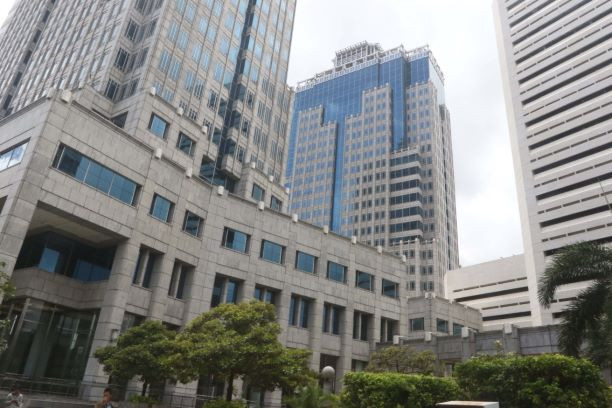Popular Reads
Top Results
Can't find what you're looking for?
View all search resultsPopular Reads
Top Results
Can't find what you're looking for?
View all search resultsHow BI wants to lure back dollars to buttress rupiah
Central bank promises exporters attractive interest rates.
Change text size
Gift Premium Articles
to Anyone
B
ank Indonesia (BI) has introduced a new policy that will grant exporters interest rates comparable with those offered by foreign banks so that they would keep their export receipts inland, all to fill up the central bank’s foreign reserves needed to maintain rupiah stability.
The move is deemed important as more than 30 months of trade surplus, including some record highs over the past year, have done little to help Indonesia fill up its foreign reserves.
Many exporters have opted to deposit their export revenue abroad, because foreign banks offered lucrative interest rates, often more than twice that available at domestic banks, according to BI data.
In effect since the beginning of March, BI says the policy has already attracted US$173 million worth of foreign exchange as of March 16 from nine exporters operating in the sectors of mining or plantations.
BI has so far appointed 20 banks to handle the transactions but said it would soon require all lenders to offer such a deposit service. The government announced earlier this year that, aside from natural resource exporters, it would also require manufacturing exporters to join the scheme.
Read also: Govt reaffirms plan to make exporters bring 30% of revenue home
How it works
An interest rate of 4.58 percent will apply for export receipts of $1 million or more that are deposited inland for at least a month, and the rate rises to 4.89 percent for tenors of six months or more. Larger amounts will yield slightly higher rates.
The rates were designed to be higher than those offered by foreign banks, BI said. For instance, four foreign banks benchmarked by the central bank based on March 15 data would offer no more than 4.46 and 4.6 percent for tenors of one month and six months, respectively.
BI said it would review the offer every three months to ensure rates remain above those of foreign banks.
“This instrument will be fully based on market mechanisms,” Ramdan Denny Prakoso, BI’s director for monetary management, told reporters during a media forum in Yogyakarta.
The export receipts are collected by domestic banks, which will be rewarded by BI with fees amounting to between 0.1 and 0.15 percent of the value, depending on the tenor. The rate may change based on BI’s period review.
Lenders will pass the export receipts on to BI, and the central bank will add them to its foreign exchange reserves.
When asked how BI could offer such high interest rates, Denny admitted that it did come at a cost for the central bank but assured reporters it could be covered by yields gained from the placement of foreign reserves in United States-denominated financial instruments, including US Treasury Bills.
No mandatory conversion
BI’s Denny has made it clear that the central bank was unlikely to make the conversion of foreign exchange to rupiah mandatory, arguing that that “would be counterproductive.”
Securing enough US dollar supply was important, he said, adding that imbalances in demand and supply of foreign currencies could impact rupiah stability despite fundamental economic factors like growth, investment and inflation showing positive signs.
“It is feared that uneven supply may result in our exchange rate not reflecting the fundamentals,” Denny said, explaining why repatriation of export receipts mattered even if those funds remained in US dollars.
Financial sector expert Manggi T. Habir told The Jakarta Post on Monday that BI had chosen a soft approach, explaining that the market-friendly mechanism was aimed at convincing exporters that BI was not engaging in foreign exchange control.
“Once we sort of close the flow out of the country [as in controlling it], people may lose trust,” Manggi said.
A temporary initiative
BI’s Denny said the policy is a temporary measure initiated by the central bank, as it realized the Indonesian financial market was still lacking instruments capable of attracting large quantities of foreign exchange on its own, which many also referred to as “shallow markets.”
This is all true as Indonesian foreign reserves’ upsides are more often affected by the influx of foreign capital coming to government bonds, but not from its market-based financial products.
Denny said deepening the financial market will take time and the more foreign exchanges can be brought home, the faster the process would commence.
“For now, BI is at the forefront, but we hope there will be a time when our own domestic financial instruments will be the one attracting exporters,” Denny said.
Read also: Indonesia's financial sector needs more depth: World Bank
Business response
Shinta Kamdani, deputy chairwoman of the Indonesian Chamber of Commerce and Industry (Kadin), noted that foreign banks would try to safeguard their deposits by preventing excessive outflows.
BI ought to be sharp, she said, adding that the central bank had to anticipate possible efforts by foreign banks to keep those funds unmoved.
“BI’s offer looks competitive enough, but only if the competition would not change much, which is unlikely, as foreign banks tend to be flexible to increase their leverage,” Shinta told the Post on Monday, adding that BI should ensure exporters enjoy smooth transactions.
Shinta said a relatively high interest rate alone may not suffice, adding that fiscal incentives, which were the government’s domain, were needed as well.
BI’s Denny said bringing in the foreign exchange would require commitments from other authorities as well as the government, which would be addressed through a revision of government regulation 1/2019 that would include tax incentives.










